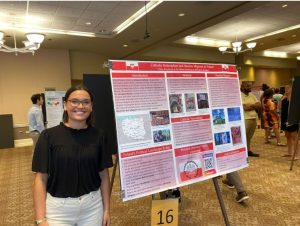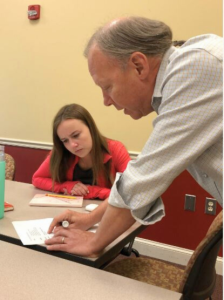- Home
- Academics
- CSRCS
- Multifaith Scholars
- Information for Mentors
Information for Mentors
Mentor Expectations and Opportunities

Multifaith Scholar, Claire Przybocki ’24, presents during the 2023 SURE.
The Multifaith Scholars program provides an excellent opportunity for Elon faculty to mentor bright and dedicated students for two years and to receive the professional development support necessary to build their skills and that relationship. Mentors will oversee the 4-credit hour research projects that students develop with their guidance and work with the MFS program director to ensure that students are fulfilling program responsibilities.
Each Multifaith Scholar will register for a total of four credits of IRS 4998 distributed across two years in discussion with the director of the program. Unless the student is studying abroad or there are other factors that would demand a different arrangement, one credit hour of IRS 4998 should be taken in each of four terms during the student’s junior and senior years. Many scholars also elect to complete summer research during the SURE Program.
Typically only full-time faculty with a continuing appointment to an academic department are eligible to mentor these long-term projects. Faculty in adjunct or visiting roles generally may not mentor MFS projects. The mentor or co-mentors (1) provides guidance as the applicant develops their project and begins their research in the first semester of the program, (2) provides direction and support as the recipient engages in the proposed program of study, (3) consults weekly with the recipient about their ongoing work.

Dr. Brian Pennington providing support to Multifaith Scholar, Katie Hooker ’20.
Successful mentorship of a Multifaith Scholar involves both academic oversight of the student’s project and support for the student’s personal growth. Specifically, mentors are expected to:
- Hold regular weekly meetings with their student during the regular academic year. Meetings should be substantive, involving preparation on the parts of both student and mentor. Mentors should review the student’s progress, address current areas of concern, and provide guidance for subsequent academic activities.
- Provide feedback that is developmental, extensive, constructive, clear, and prompt.
- Comply with Multifaith Scholarship expectations, policies, and deadlines, and communicate effectively and in a timely manner with the Multifaith Scholars director.
For co-mentored projects both mentors should write the letter of support together that includes a co-authored mentoring plan.
Professional Development and Mentor Support: In addition to the compensation provided to faculty mentoring students in 4998 research hours, mentors may apply for funding to develop the skills and resources required for mentoring high-quality undergraduate research. Particularly because research focused on multifaith topics may extend mentors’ skillsets into new areas of expertise, the Multifaith Scholars program has limited funds that are intended to support professional development of faculty in their roles as mentors as well as opportunities to enhance knowledge and acquire skills directly related to the MFS program and mentees’ projects. Mentors can access funds by advance application to the director, Dr. Amy Allocco. These funds are available as reimbursement for costs incurred to enhance the faculty member’s ability to mentor their Multifaith Scholar effectively. Examples include:
- travel to conferences where the primary role of the faculty member is mentor to their Multifaith Scholar;
- participation in workshops designed to develop mentoring skills and/or multifaith literacy and learning;
- organizing a discussion series with other mentors to develop and share best practices;
- books, equipment, or other materials that will enhance the faculty’s ability to mentor their Multifaith Scholar; and
- other costs directly related to developing expertise and knowledge associated with mentoring your Multifaith Scholar.
Mentors wishing to apply for these funds should submit a proposal before incurring any expenses. Proposals should describe in concrete terms what the applicant wishes to do, why they wish to do it, how they intend to do it, and what outcomes they foresee. In addition to detailing specific mentoring activities and their potential benefits, proposals should include a detailed budget and indicate any additional sources of support applied for or received (e.g., mentoring grants available through the UR Program). Mentors of Multifaith Scholars may be eligible to apply for additional funds available from the Undergraduate Research Program to support professional development for mentors. MFS mentor funds are competitive and offered on a rolling basis, and mentors of Multifaith Scholars should not apply for them until other potential funding has been fully explored.